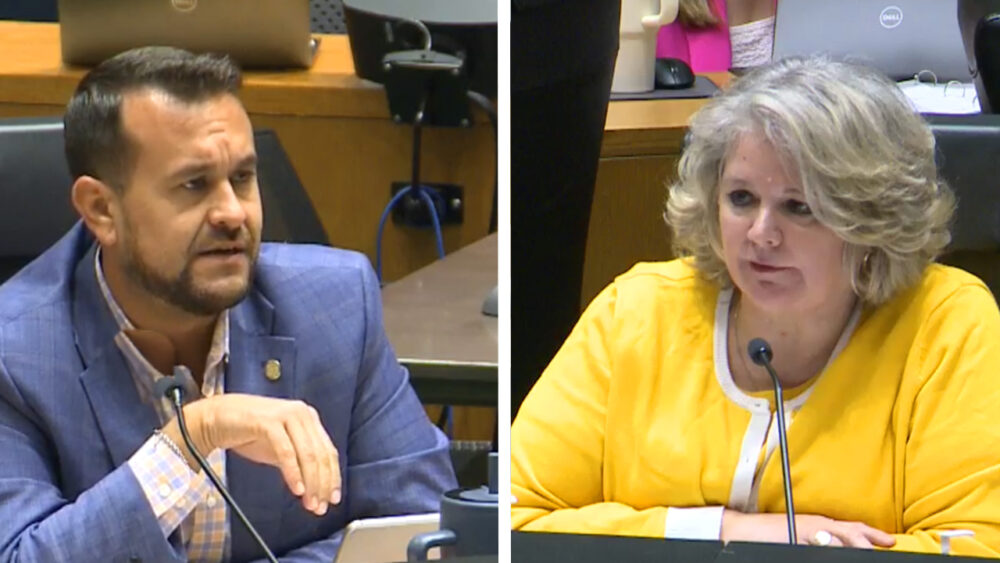Dallas City Council rejected Councilwoman Cara Mendelsohn’s push for a steeper property tax cut, instead approving a cap she warned could create a multimillion-dollar “slush fund.”
The council voted 10-5 to set a maximum rate of $0.7022 per $100 valuation, a move city staff said could leave Dallas with a $5.5 million surplus in the 2025-26 budget. The final tax rate will be decided after a Sept. 17 public hearing.
“I’ve been here for six years. This budget continues to grow,” Mendelsohn said in the meeting. “‘We’re just going to throw it in for flexibility.’ Well, let me tell you, flexibility means slush fund.”
The current tax rate is $0.7047. City Manager Kimberly Bizor Tolbert suggested lowering it slightly to $0.6997, while Councilman Adam Bazaldua offered the $0.7022 compromise that ultimately passed.
Bazaldua said his proposal gave the city “flexibility” ahead of the final vote. “I just think this is a little bit premature of an action, and I don’t want to bind us.”
Creating Competition
Mendelsohn challenged Bazaldua’s cap, saying Dallas needs accountability. She proposed a cap of less than $0.6732, a “no new revenue tax” rate.
“Live within our means. It means making choices, trimming what isn’t working, putting our focus on where it belongs – which is public safety, streets and transportation, and parks,” she said. “It’s about showing Dallas that we’re serious about affordability and competitiveness.”
Mendelsohn pointed to other cities, including Houston – considering a rate of $0.52, San Antonio – considering a rate of nearly $0.55, and Austin – considering a rate just more than $0.5740. Closer to home, Fort Worth is considering a rate of $0.67, which is still lower than Dallas.
“If Houston, San Antonio, Austin, and Fort Worth can thrive with a lower property tax rate, so can Dallas,” Mendelsohn said. “It’s past time for us to recognize we have some neighboring cities with better roads, quicker police response times, and a property tax rate that is substantially less than our proposed rate.”
As of June, Dallas police took an average of more than 11 minutes to respond to top-priority emergencies, while they took an average of more than five hours to respond to lowest-priority calls, as The Dallas Express reported.
Mendelsohn also said Arlington, Carrollton, Coppell, DeSoto, Frisco, Grand Prairie, Irving, Lancaster, McKinney, Plano, and Richardson have lower property tax rates than Dallas.
“All around us, cities have grown, but our population has stagnated,” she said. “How can we expect to attract families and businesses to our city when our property tax is way beyond our peers?”
City Councilman Jaime Resendez opposed Mendelsohn’s suggested cap, saying it would hinder “public safety” and “infrastructure improvements.”
“About 85 percent of the tax base in this city is north of I-30,” Resendez said. “So for those of us that represent districts in southern Dallas specifically, it wouldn’t be responsible for us to support this proposed amendment.”
The council rejected Mendelsohn’s amendment 13-2. She later backed the city manager’s lower cap, which also failed, 9-6.
Enabling A ‘Slush Fund’?
Chief Financial Officer Jack Ireland said property values grew 5.3% year over year, adding $11.3 billion, meaning even a lower tax rate would still increase revenue.
“The reality is, we are going to have more money this coming fiscal year than we have currently,” Mendelsohn said.
She noted the city manager’s proposed cap – still less than Bazaldua’s – would have increased tax revenue. “And then we’re going to add in a slush fund level of another – is it $5 million? $5.5 [million]. Nobody knows what it’s going to be for.”
Bazaldua countered that his cap was below the current rate and denied it created a slush fund.
“I’m not looking at creating an opportunity for people to have a slush fund, to go have pet projects,” he said. “I’m looking at future years where we are going to be tightening our belt more than we’ve ever had to in our city’s history because of state legislation.”
Mendelsohn called the city council to “hold the line,” keep taxes affordable, and show citizens officials “value every single dollar they send to City Hall.”
“If we want Dallas to compete, we can’t keep burdening our residents and businesses with such a heavy load,” she said. “Every household in Dallas has to live within its means, and it’s time Dallas City Hall did the same thing.”


